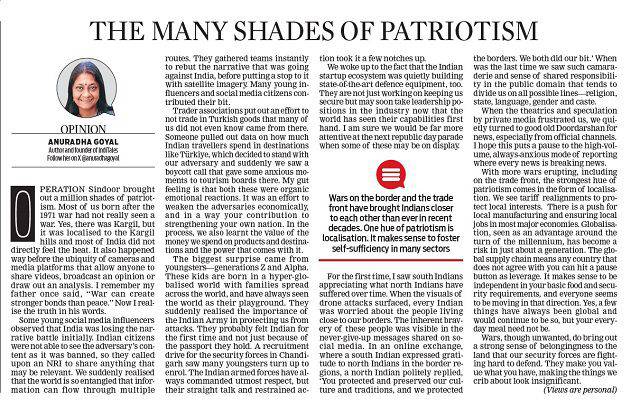Operation Sindoor brought out a million shades of patriotism. Most of us born after the 1971 war had not really seen a war. Yes, there was Kargil, but it was localised to the Kargil hills and most of India did not directly feel the heat of it. It also happened way before the ubiquity of cameras and media platforms that allow anyone to share videos, broadcast an opinion or draw out an analysis. I remember my father once said, “War can create stronger bonds than peace.” Now I have realised the truth in his words.

Some young social media influencers observed that India was losing the narrative battle initially. Indian citizens were not able to see the adversary’s content as it was banned, so they called upon an NRI to share anything that may be relevant. We suddenly realised that the world is so entangled that information can flow through multiple routes. Technology options like virtual private networks are always possible, but you may find yourself on the wrong side of the law. They gathered teams instantly to rebut the narrative that was going against India, before putting a stop to it with satellite imagery. Many young influencers and social media citizens contributed their bit.
Trader associations put out an effort to not trade in Turkish goods that many of us did not even know came from there. Someone pulled out data on how much Indian travellers spend in destinations like Türkiye, which decided to stand with our adversary and suddenly we saw a boycott call that gave some anxious moments to tourism boards there. My gut feeling is that both these were organic emotional reactions. It was an effort to weaken the adversaries economically, and in a way your contribution to strengthening your own nation. In the process, we also learnt the value of the money we spend on products and destinations and the power that comes with it.
The biggest surprise came from youngsters—generations Z and Alpha. These kids are born in a hyper-globalised world with families spread across the world, and have always seen the world as their playground. They suddenly realised the importance of the Indian Army in protecting us from attacks. They probably felt Indian for the first time and not just because of the passport they hold. A recruitment drive for the security forces in Chandigarh saw many youngsters turn up to enrol. The Indian armed forces have always commanded utmost respect, but their straight talk and restrained action took it a few notches up.
We woke up to the fact that the Indian startup ecosystem was quietly building state-of-the-art defence equipment, too. They are not just working on keeping us secure but may soon take leadership positions in the industry now that the world has seen their capabilities first hand. I am sure we would be far more attentive at the next republic day parade when some of these may be on display.
For the first time, I saw south Indians appreciating what north Indians have suffered over time. When the visuals of drone attacks surfaced, every Indian was worried about the people living close to our borders. The inherent bravery of these people was visible in the never-give-up messages shared on social media. In an online exchange, where a south Indian expressed gratitude to north Indians in the border regions, a north Indian politely replied, ‘You protected and preserved our culture and traditions, and we protected the borders. We both did our bit.’ When was the last time we saw such camaraderie and sense of shared responsibility in the public domain that tends to divide us on all possible lines—religion, state, language, gender and caste.
When the theatrics and speculation by private media frustrated us, we quietly turned to good old Doordarshan for news, especially from official channels. I hope this puts a pause to the high-volume, always-anxious mode of reporting where every news is breaking news.
With more wars erupting, including on the trade front, the strongest hue of patriotism comes in the form of localisation. We see tariff realignments to protect local interests. There is a push for local manufacturing and ensuring local jobs around the world in most major economies. Globalisation, seen as an advantage around the turn of the millennium, has become a risk in just about a generation. The global supply chain means any country that does not agree with you can hit a pause button as leverage. It makes sense to be independent in your basic food and security requirements, and everyone seems to be moving in that direction. Yes, a few things have always been global and would continue to be so, but your everyday meal need not be.
Wars, though unwanted, do bring out a strong sense of belongingness to the land that our security forces are fighting hard to defend. They make you value what you have, making the things we crib about look insignificant.
This article was first published in The New Indian Express on Aug 10, 2025.








